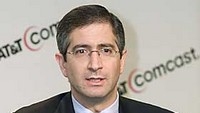Cable executives say Internet is not a threat

Contrary to pervasive thinking throughout the industry, at the Cable Show in Washington, D.C., industry executives claimed that the Internet is not a threat to their paid subscription services. However, they did acknowledge that there are still major technical challenges to overcome to make their services work online.
Others — not in a position of having to defend the existing cable business model — are not so sure the pay television industry can continue to thrive in an era of free or cheap Internet distribution of programming.
“I think [the Internet] is a friend, not foe,” Brian Roberts, chief executive of Comcast, told attendees of the Cable Show. “I don’t think we should put our heads in the sand. We want to get that video to customers wherever they want it.”
Comcast and Time Warner Cable are among the cable operators currently looking at new ways of enabling Internet access for customers who already pay for programming as part of their cable subscription package. Comcast calls its experiment for Internet-based programming “On Demand Online.” Time Warner labels it “TV Everywhere.”
However, cable operators and programmers see technical challenges ahead and are dealing with ways to authenticate paid subscribers in a simple enough way to avoid driving them to existing free services.
Peter Stern, Time Warner Cable’s chief strategy officer, said cable companies must develop consistent technical standards for all operators and programmers. With this, he said, comes a simple user ID interface online that confirms authorization quickly. “The risk is if we don’t make it easy for them to get online video, they’ll turn to piracy,” Stern said.
Robert Iger, CEO at Walt Disney, said he was open to exploring the idea of running entire cable networks online if it’s possible to verify the identity of subscribers. ABC’s experience with digital, he said, found that viewers who stream shows online are high-end users more likely to have HDTV sets and on-demand home services.
The professional video industry's #1 source for news, trends and product and tech information. Sign up below.
“The fact is people are watching more TV than ever before — even as their ability to watch programming on other devices has increased dramatically,” Iger said.
Cable executives are acutely aware of the problems faced by the music and newspaper industries as they try to deal with online distribution. Both industries have simultaneously tried to protect and give away their content online. And both industries have failed in those strategies, causing many music and print outlets to go out of business.
News Corp. chief executive Rupert Murdoch, an owner of both television and newspaper outlets, told the Cable Show that the proliferation of content available online for free is breaking the industry's business models. “Nobody is making money with free content on the Web except search,” he said, calling on his rivals to begin charging for Internet content.
Full-length television shows on the Internet have proven to have tremendous popular appeal, as millions of viewers log-on to catch up on episodes they miss on broadcast television and to discover new shows.
Hulu, the free Web site that’s a joint venture of NBC Universal and the News Corporation, had more than 35 million unique viewers in February — a 42 percent increase from January, according to comScore. And the ratings for some network programs, such as “Lost” on ABC, increased as much as 25 percent if online views were included, said Nielsen, the ratings service.
Today, most network television shows are available for free viewing online — both with and without commercials. So far, most cable programs are not online.
Advertisers have balked at paying top dollar for television content delivered over the Internet to computers. The issue is beginning to jeopardize the business model between the television networks with their cable and satellite providers. There’s also fear that free Internet TV may be beginning to chip away at the $60 billion-a-year subscription television business by allowing people to turn off cable services.
Revenues and stock prices of the major media companies have fallen significantly in the last six months, giving ammunition to the critics who think an online approach solely supported by advertising is flawed.
Confusing the picture further is the trend of video moving from the personal computer to the television set and other more portable viewing devices. Products like Netflix’s Roku digital movie player, which allows unlimited low-cost movie viewing on any TV, and the Apple TV set-top box do just that. And start-ups like Boxee, which also brings the Internet to the television, are also a threat.
